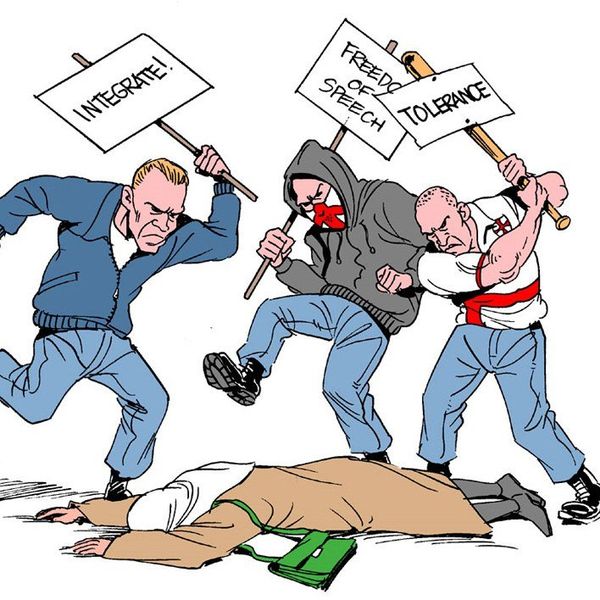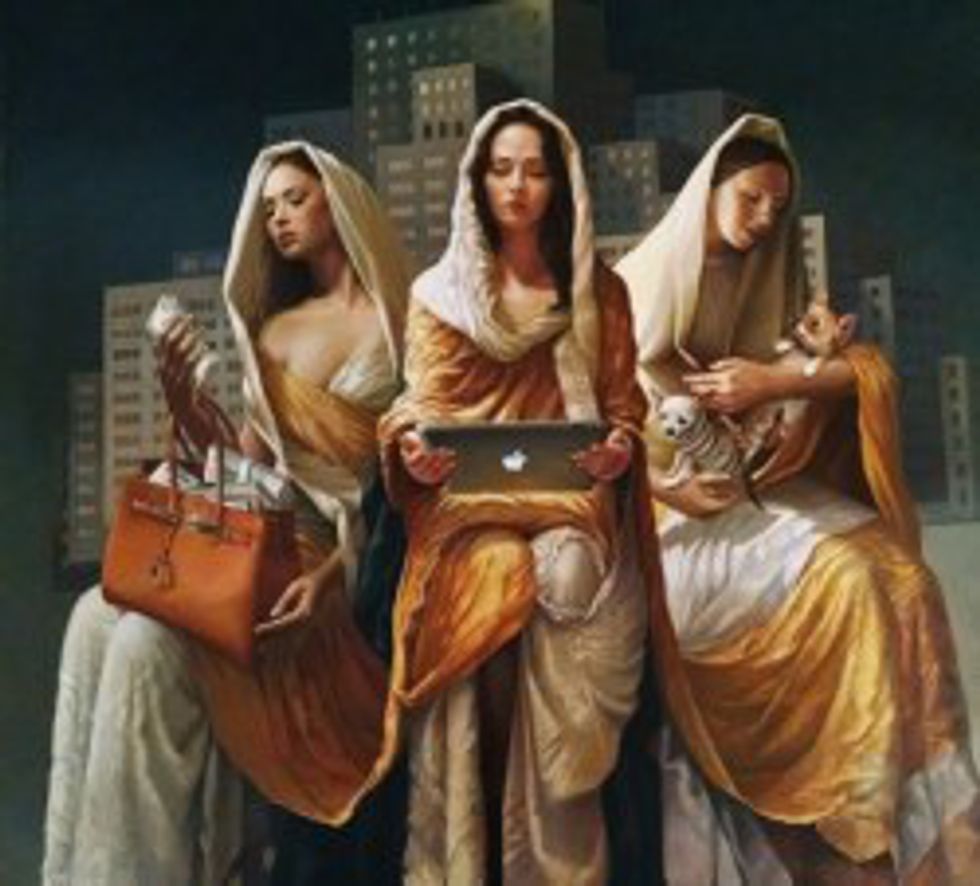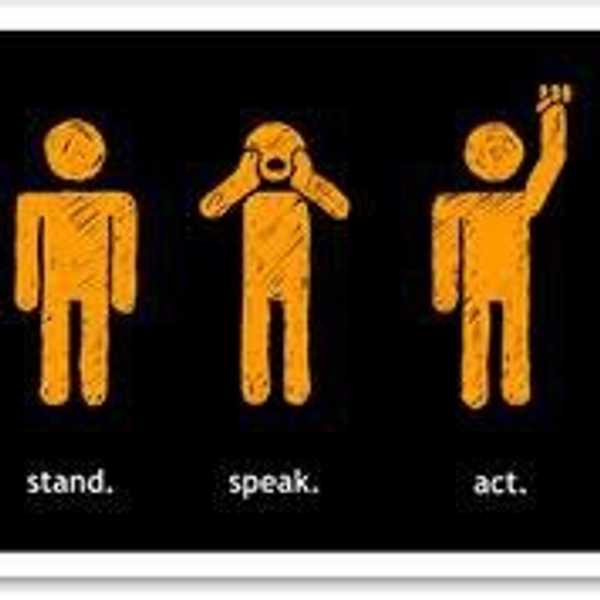Modern day Russia is a strange place, and looking into its past just leads to more confusion. A socialist country ruled by totalitarians throughout much of the 20th century has now become one of the world’s largest powers, ruled by a semi-presidential government. The Russian Federation plays such a monumental role in world politics, and their arsenal of nuclear weapons has provided Russia a seat on the United Nations Security Council. After the collapse of the Soviet Union in 1991, the difference in the new political ideologies was like night and day in comparison with the Soviet ideologies. The Russians began trying a multi-party democracy, a drastic change from the totalitarian ideas of Stalin and those who followed. In the 90s, the media was slowly liberated, the KGB was disbanded, and propaganda was seen as an ineffective method of controlling the people. The citizens of Russia welcomed the new ideas, and for a short period at the end of the 20th century, it looked as if Russia might permanently embrace democracy and other liberal ideas. After Vladimir Putin took control of the Russian Federation in 2000, some of these liberal ideas began disappearing, along with important documents as well as people. What was worse was the rise of new ideas that were eerily similar to those of Soviet leaders, such as propaganda, state-owned enterprises, and a successor to the KGB to name a few. Looking at the Russian Federation today, it seemed as if Vladimir Putin has begun utilizing similar socialist and totalitarian ideologies used in Soviet Russia in an attempt to revive and maintain a Soviet mindset in modern day Russia.
In the 19th and 20th century, Russia was a nation that suffered from a multitude of problems. Throughout these problems, however, Russia was able to pick itself back up, and as can be seen by history, win the second World War, put a man in space, and utilize its nuclear arsenal to instill fear in the rest of the world. But in fact, Russia was not the nation that accomplished these feats, it was the Soviet Union. The Soviet Union was the nation that the world feared, and the nation that ended up helping save the world from Nazis during World War II. When the people of Russia look back at their history, they also recognize the fact that it was the Soviet Union that triumphed, not Russia. Vladimir Putin began implementing similar Soviet ideologies after he was elected president in 2000, as well as promising many policy changes similar to the policies in the Soviet Union. Some of these policies and tactics include but are not limited to the use of propaganda and the idea that Russia is “surrounded by enemies”, a successor to the KGB, and attempts to justify restricting human rights in Russia by promising the citizens safety. It looks as if the people of Russia recognize the connection between Putin’s policies and the policies of Soviet leaders, and they believe that since Putin shares many ideas with the Soviet leaders, he will be able to maintain their country’s legacy. In an attempt to recreate a grand history for Russia, the people seem to allow Vladimir Putin to rule with his Soviet ideals, and the people of Russia are willing to give up certain rights in order to feel as if their strong leader will protect them from the world that he claims is going out of its way to destroy Russia.
The idea that many people find confusing is that the people of Russia are openly embracing the new changes and restrictions to their freedom, as well as responding favorably to methods such as propaganda and the idea that Western media is attempting to brainwash the people. Sergei Kovalev’s political essay, “Why Putin Wins”, goes into detail about the methods used by Vladimir Putin to maintain power in Russia. He also explains the restrictions of freedom that Putin has introduced to his people, and the positive responses by those citizens. Kovalev also describes the 2000 presidential race and the mindset of the voters as they voted against democracy. “A Man Like Putin”, a song by the Russian music group Singing Together, attempts to analyze the qualities Vladimir Putin shares with a good boyfriend; namely, his strength, loyalty, and his selflessness. A song that was originally a bet made by the producer of a Russian music studio, became a national hit, mysteriously rising to the top of the Russian music charts. Finally, Stanislav Plutenko’s acrylic painting “Madonnas of Modernity” depicts three women dressed in traditional Russian clothes, while sitting in front of a massive city on their various Apple products. His painting shows the desire for many Russians to revive ideas from the past, while also attempting to keep up with the changing world around Russia. These three artifacts will each play a critical role to help convey Russia’s nostalgia for Soviet ideals, and how Vladimir Putin, along with the people of Russia, are beginning to revive those ideas in the 21st century.
“Why Putin Wins,” a political essay by Sergei Kovalev, goes into detail about the tactics used by the Russian president to win and maintain power in his country despite the many policies that expel and restrict certain rights of the Russian people. The essay begins by explaining Kovalev’s stance on the Russian president, using words like “sinister” and “offensive” to describe Putin and his policies. His stance on the president stays negative throughout the essay, but he does attempt to recognize the different aspects of Putin that seem appealing to many Russians. He also explains the 2000 presidential election between Putin and his liberal opponent, Grigory Yavlinsky. Although it was never confirmed, many believe Putin and his advisors were able to control the local media into releasing information stating the supporters of Yavlinsky were all Jewish or homosexual. Throughout his essay, Kovalev explores the possible reasons for the citizens of Russia allow for a man who lied his way into power, restricts basic freedoms, and imprisons anyone who opposes him to rule them.
To convince the Russian people that he was capable of reviving the legacy of previously successful Russian leaders, Vladimir Putin needed to appear a strong leader, similar to the Russian tsars and Soviet leaders. Propaganda is a very effective method used by hundreds of leaders throughout history for implanting an idea into the public’s mind. Vladimir Putin was lucky however, and the propaganda was practically given to Putin. Two years after Putin was elected president of Russia in 2000, a song depicting him as a dependable and strong boyfriend was released by a Russian music group known as Singing Together, and the song mysteriously rose to the top of the music charts in Russia. The writer of the song was interviewed by PBS shortly after the song mysteriously rose to the top of the charts. Mr. Yelin, the writer of the song, says he wrote it as a joke on a $300 bet with a friend. "All I needed was the right message, what can a girl sing about? She can't sing that Putin is great. That would be stupid and it wouldn't be funny. But she can sing that everything around her sucks, and she needs a man like Putin” (Yelin). The song was soon played on every radio station in Russia, and it only took a few days before practically everyone in Russia knew the song. Although it is never directly stated, it is very likely the song was promoted by Putin himself, and he ensured it was heard by everyone. The song is named “A Man Like Putin”, and explains a woman’s failing relationship with her boyfriend, and her desire for a boyfriend who exhibits the same physical and emotional qualities of Vladimir Putin. Today, the song is still played at Putin’s rallies, and many associate it as a type of theme song for Vladimir Putin. A music video was even released by the Russian government that portrays Putin and a buddy sitting in a very expensive looking room, watching beautiful women dancing on television, all the while Putin is seen conversing with political figures from around the world. Overnight, the song mysteriously found its way to number one on the music charts in Russia, an act most likely done by Vladimir Putin himself. Platforms like this allows for Vladimir Putin and his cabinet to expose the citizens of Russia to "propaganda".
The drastic changes in communication and society in general were felt all around the world at the turn of the 21st century; however, instead of fighting these new changes to society, Vladimir Putin embraced them. The new forms of communication allowed for Putin to easily spread his ideas to every corner of Russia, and it also allowed him to control the news that his citizens would be receiving, very similar to the way Stalin controlled the news in Soviet Russia. Stanislav Plutenko, an acrylic painter from Russia, recognized the changes that Russia was beginning to face. The artist also recognized that with these new changes, it would be hard for many Russians to continue praising the old Soviet ideals while also keeping up with the ever changing technology that was beginning to invade their everyday lives. Stanislav Plutenko’s acrylic painting “Madonnas of Modernity” depicts the nostalgia for Russia’s great past, as well as the need to keep up with society and all the new devices and forms of communication that came with it.
"Madonnas of Modernity" Stanislav Plutenko
At the end of the 20th century it looked as if Russia might give up the Soviet ideas that were prominent in Russia for the better part of a century. Once Vladimir Putin took power in 2000, however, it could be clearly seen that Russia was not ready to give up those Soviet ideas. It was also clearly seen that the people of Russia were not ready to give up those ideas either. While Westerners associate Soviet Russia with fear and hate, the Russians look at the Soviet Union differently. To Russians, the 20th century was a time when Russia saved the world from Nazis, sent a man to space, and competed with the United States of America for a spot as the most powerful nation in the world. Russia was feared, and therefore respected. So it really is no wonder that Russians would want to be respected yet again. To do this, the Russians knew they needed a leader with similar idea and a similar personality to those leaders from 20th century Russia: strong, fearless, and loyal. Vladimir Putin was clearly that man, as he not only exhibited all those qualities, but his ideas and policies for Russia were so incredibly similar to those of Stalin. Vladimir Putin utilized propaganda, instilled fear (as well as a sense of protection) in his people, and attempted to prove to them that liberalism was evil and weak, but his socialist policies were strong and would bring Russia back to its former glory. The Russians obviously want to see Russia return to its former glory, and have embraced Vladimir Putin’s policies due to their nostalgia for a powerful Russia. The nostalgia of the Russian people for a 20th century Russia has allowed Vladimir Putin to force his Soviet ideas onto the country and its people, and in return for giving up certain rights, the people of Russia believe that they are safe from the world that Stalin, Putin, and other leaders have proven to be dangerous.






















